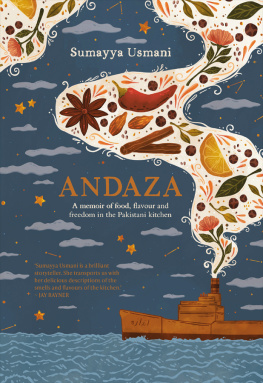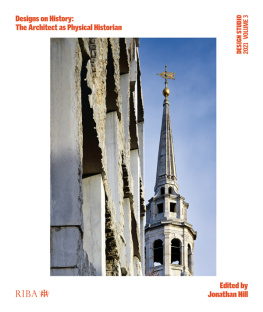Sumayya Usmani - Andaza
Here you can read online Sumayya Usmani - Andaza full text of the book (entire story) in english for free. Download pdf and epub, get meaning, cover and reviews about this ebook. year: 2022, publisher: Corinne Roberts and Céline Hughes, genre: Home and family. Description of the work, (preface) as well as reviews are available. Best literature library LitArk.com created for fans of good reading and offers a wide selection of genres:
Romance novel
Science fiction
Adventure
Detective
Science
History
Home and family
Prose
Art
Politics
Computer
Non-fiction
Religion
Business
Children
Humor
Choose a favorite category and find really read worthwhile books. Enjoy immersion in the world of imagination, feel the emotions of the characters or learn something new for yourself, make an fascinating discovery.
- Book:Andaza
- Author:
- Publisher:Corinne Roberts and Céline Hughes
- Genre:
- Year:2022
- Rating:5 / 5
- Favourites:Add to favourites
- Your mark:
- 100
- 1
- 2
- 3
- 4
- 5
Andaza: summary, description and annotation
We offer to read an annotation, description, summary or preface (depends on what the author of the book "Andaza" wrote himself). If you haven't found the necessary information about the book — write in the comments, we will try to find it.
Andaza — read online for free the complete book (whole text) full work
Below is the text of the book, divided by pages. System saving the place of the last page read, allows you to conveniently read the book "Andaza" online for free, without having to search again every time where you left off. Put a bookmark, and you can go to the page where you finished reading at any time.
Font size:
Interval:
Bookmark:

Sumayyas words awakened my senses almost synaesthetically: I could taste the sounds, visualise the flavours, and hear the colours of Pakistani cooking. Her story felt new, exciting, but also familiar in a visceral kind of way. OLIA HERCULES
I cant decide whether I want to devour Sumayyas story or her recipes first, but this has left me hungry to travel, to explore ... and, of course, to eat. FELICITY CLOAKE
The cooking of Sumayyas Nani Mummy, Dadi and phuppos has me hungry to know more of this culture: these dishes, and the comfort, love and support that they bring. TESSA KIROS
From a young age, food was Sumayyas portal to love and self-expression. She spent the first years of her life at sea, with a father who captained merchant ships and a mother who cooked for the family on a tiny electric stove in their cabin. When the family moved to Karachi, Sumayya grew up torn between the social expectations of life as a young girl in Pakistan, and the inspiration she felt in the kitchen watching her mother, and her Nani Mummy and Dadis confidence and effortless ability to build complex, layered flavours in their cooking.
This evocative and moving food memoir which includes the most meaningful recipes of Sumayyas childhood tells the story of how her self-belief grew throughout her young life, allowing her to find her own path amidst the expectations of following in her fathers footsteps as a lawyer and the pressures of a Pakistani womans presumed place in the household. Gradually, through the warmth of Sumayyas family life, the meaning of andaza comes to her: that the essence of a recipe is not a list of measured ingredients, but a feeling in your hands, as you let the elements of a meal come together through instinct and experience.


To Mummy, Daddy and Ayaana


Contents
ABOUT ANDAZA
When I imagine my mother, I see her in the kitchen, immersed in the act of preparing a meal, measuring spices with her fingers. My memories of my Nani (maternal grandmother) Nani Mummy, as I called her are of her crouched over her white enamel cooker, stirring rice pudding. In my reminiscences of my Dadi (paternal grandmother), she is always in the kitchen, silently commanding my five aunts as they cooked large family meals.
Both of my grandmothers, and my mother, cooked without recipes, recollecting and recreating meals using their senses. I grew up around this way of cooking called andaza , which translates as estimation, but really encompasses what I like to think of as the art of sensory cooking. Even as a young child I was fascinated by the idea that a recipe could turn out differently when it was cooked by someone else, that we all had a different flavour in our hands that made a dish unique to us this felt like alchemy to me.
In my family, the processes involved in creating a meal were sometimes laborious and painstaking, beginning with the careful selection of produce at the market each week, but no one questioned them and there were never any complaints. No meal was just a one-dish affair; daily meals involved simple dishes, but there were always many of them to share, each with an abundance of flavour and texture. Mealtimes meant more than just eating together; they were a time to savour the labour and the bounty laid out before us.
I began to appreciate that part of our role as women was to provide nourishment and nurturing. The kitchen was a space exclusive to the women in the family, who would gather there to cook or to keep each other company, to laugh and joke, to share recipes and stories. There was always life in the kitchen it was almost a sacred space, the female domain, willingly occupied not from a sense of duty but rather a sense of ownership and togetherness. The kitchen was a place of effortlessness, of belonging and of strength, and as a child it was my place of consistency and comfort.
Growing up, I always felt a little displaced. I was born in Karachi and lived there until I was a year old, but then led a wandering life aboard merchant ships as a child, interspersed with spells in Karachi and short bursts in England between voyages, before spending my adolescence and adulthood back in Karachi. I struggled with conformity, convention and what it meant to not have had a normal childhood. My teenage years in Pakistan took place during a turbulent time of martial law and restrictions, followed by political strife. The kitchen was the one place I felt secure, there was something about its dependability in my life that made it feel like home. There was such familiarity and security in knowing that the same aromas, flavours and textures my mother made on the ships could be recreated in another place, at another time. So whenever I yearned for a sense of belonging, I gravitated towards the kitchen. For me, home was never just a place; it was a sensory experience that began in the kitchen.
This is my coming-of-age story, a story about how cooking offered strength in times of weakness and ease in times of sadness, and about how trusting my senses in the kitchen helped me to trust my intuition and equipped me with the confidence to navigate lifes challenges. Its also a book that explores the hidden world of Pakistani women, based on several generations of my family and what the kitchen means to them. Although this is my personal story, I hope it will resonate with other free-spirited cooks and believers in the magic created in the kitchen.
The kitchen was a place of effortlessness,
of belonging and of strength, and as a child
it was my place of consistency and comfort.

CHAPTER 1
You cant cook with words

Early in my life I learn that recipes dont need to be written. Like storytelling, they guide you through an unfamiliar terrain and, like all good stories, they evolve with each storytellers instinct and imagination, and cease to exist if they arent shared.
Sea of Japan, October 1977
BURNT FUDGE
Furious waves crashed against the hull as the ship rolled and pitched. The wind outside our cabin shook the steel doors and whistled through the crevices of the portholes. A light flickered above Mummys head.
She was making sticky, impossible fudge, stirring butter, sugar, saffron and condensed milk together while the ship swayed to and fro. Taking a pinch of saffron, she ground it between her fingertips. The crushed flecks looked like stars dancing in a caramel sea. The electric frying pan was on high, and smoke swirled around the low metal ceiling of her makeshift galley. Meanwhile, I was holding on to a mattress, tied to either side of the floor, my pink and white polka-dot nightie soaked with tears.
Gogi, I wept. Please come back, Gogi. My howling mingled with the howling of the wind outside.
Font size:
Interval:
Bookmark:
Similar books «Andaza»
Look at similar books to Andaza. We have selected literature similar in name and meaning in the hope of providing readers with more options to find new, interesting, not yet read works.
Discussion, reviews of the book Andaza and just readers' own opinions. Leave your comments, write what you think about the work, its meaning or the main characters. Specify what exactly you liked and what you didn't like, and why you think so.




